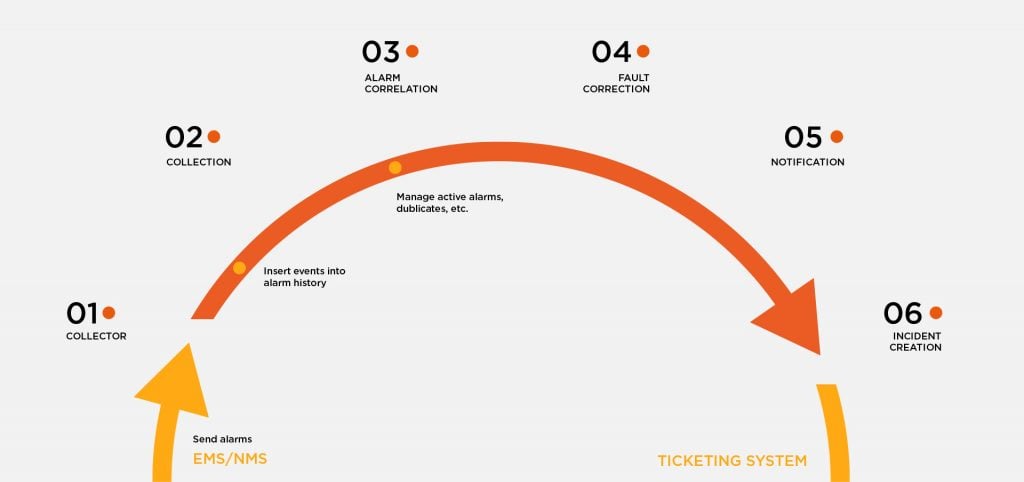Boost Network Quality and Customer Experience with the INNSPECT Telecom Network Fault Monitoring and Management System
Increasingly complex networks, multiple vendors and technologies, and unprecedented network demands create an environment prone to errors and inconsistencies. Alarm systems lie at the heart of NOC’s network troubleshooting arsenal in identifying and remedying issues to boost network quality and enhance the end-user experience.
However, network engineers require granular data like correlated alarms, resources and locations, related trouble tickets, outages, alarms from the same resource/location, historical alarms, and know-how entries to sift through alarms and act on the critical ones.
INNSPECT telecom fault management system receives, displays, and tracks network-wide alarms through unified event processing paths built on a correlation engine that significantly reduces Mean-Time-To-Repair (MttR) and network downtime. INNSPECT delivers superior and time-sensitive automated root cause analysis, rapid isolation and resolution of critical alarms, and automatic rule generation to solve known repetitive alarms.
Discover Next
Fault Impact
Reporting
Improves quality of service (QoS) and quality of experience (QoE) by diagnosing customer impacting faults. Automatic Alarm
Classification & Resolution
Helps to classify, prioritize, and focus important alarms, while automating the resolution processes.
Fast Response
Time
Empowers fast troubleshooting on critical faults by fast forwarding messages to the NOC/SOC teams. Machine Learn
Engine
Uses ML Root Cause Analysis algorithms to quickly locate the source of the problems and reduce MTTR. What is Mobile Telecom Network Fault Management and Why is Fault Analysis Important?
Definition
Network fault management is the process of detecting, isolating, and correcting network malfunctions and inconsistencies in a telecommunications network. The fault management function compensates for system, usage and environmental changes, and covers error and alarm maintenance, analysis, categorization, automation, and resolution.
Why is Fault Analysis Important?
A mobile telecom fault management system receives error detection notifications, tracing and identifying faults. Fault analysis carries out sequences of diagnostics root cause tests on this data, providing insights on possible corrective measures, reporting error conditions, and localizing and tracing faults by examining and manipulating database information generated from network-wide fault collection parameters.Types Of Mobile Telecom Network Data And Alarms That Are Monitored With Network Fault Management
Mobile telecom fault management systems analyze and report five core network failure events and alarms:
- Resource Failure Alarms (e.g., power outage, natural disaster)
- Equipment Failure Alarms (e.g., mast misalignment, wire cuts)
- Database Failure Alarms (e.g., issues with cloud and virtualized
environments) - Software Failure Alarms (e.g., software updates, bugs)
- Configuration Error Alarms (e.g., configuration inconsistencies)

Using Artificial Intelligence (AI) to Detect and Correct Faults in Mobile Telecom Networks
Multi-Vendor, Multi-Technology Network Environments
Multi-vendor and multi-technology network environments significantly increase the chances of errors and inconsistencies, resulting in more alarms. AI can address these alarms quickly and efficiently and act upon or escalate the critical ones while automatically resolving repetitive alarms.
Rapidly Growing Networks
Rapidly growing networks due to IoT and machine-to-machine devices create dense networks prone to errors and inconsistencies. AI accurately and efficiently addresses a torrent of alarms at scale across heterogeneous networks while reducing MttR and guaranteeing network quality.Increased Competition for Users
Quality of Experience (QoE) is an increasingly prominent KPI as MNOs battle it out with competitors for subscribers. Investing in AI technologies accelerates the isolation, identification, classification, and resolution of alarms, unlocking efficiency gains that empower MNOs to remain competitive.
Overcoming Network Expansion Constraints
Networks are snowballing, overstretching NOCs as the complexity of managing them increases. Onboarding new devices, nodes, and network functions using AI-powered integrated network fault management systems results in fewer errors and inconsistencies, significantly shortening MttR and supporting network quality.

INNSPECT: The Leading Mobile Telecom Network Fault Management System from Innovile
INNSPECT is part of the integrated Innovile Zero-touch Network Automation suite of products. The fault management system continuously monitors network-wide alarms, leveraging a correlation engine to provide root cause analysis and generate actionable reports. INNSPECT’s core capabilities detect, isolate, notify, and correct faults encountered in the network, functions it achieves through an integrated modular architecture.
INNSPECT delivers three core capabilities to NOCs:
Alarm
Prioritization
Not all alarms warrant an intervention from highly skilled NOC engineers. INNSPECT automatically sorts through thousands of alarms, prioritizing them based on inbuilt parameters, enabling NOC engineers to act on critical alarms, saving time, and reducing network downtime. Automated Root
Cause Analysis
Root cause analysis of network errors is a time-consuming process. INNSPECT automates this process through machine learning, generating network models and automatically identifying dependencies between system events. NOC engineers can rely on resulting granular reports generated to make data-driven decisions quickly. Rule
Generation
Machine learning is at the core of the rule generation module. Continual collection of network data feeds into the ML system, generating network models that define rules that the system can automatically apply to resolve repetitive alarms without the intervention of NOC engineers, saving time and building self-healing capabilities into the network. Network Performance and Fault Management Best Practices
Innovile suggests important tips for CSPs Fault Management operations:
- Understand your network. Deep knowledge of network elements and available data will make solution design more straightforward. Of course, Innovile’s experts can help there too.
- Make sure that your fault management and monitoring system is 5G ready and future-proofed for 6G and related changes like O-RAN.
- Leave the complexity behind and look for seamless integration (e.g. out-of-the-box open interfaces and API integration) to reduce deployment costs and project time.
- Take automation to the core of your network monitoring and management operations reducing repetitive tasks.
- Assess and incorporate all data elements that provide
real-time or near-real-time monitoring capability where feasible to reduce the impact of issues. - Plan to ensure the extendibility of the system as your network evolves.
- Ensure that your fault management system provider is vendor-agnostic and Telco-centric.
- Consolidate alarms to meaningful and prioritized dashboard layouts to improve the effectiveness and efficiency of operations from a single platform across the network.

Benefits of Implementing INNSPECT Telecom Network
Fault Management Solution
Continuous Network Alarm Monitoring
Gain insights into your network through continuous alarm monitoring across all sites. INNSPECT network fault monitoring solution is designed to be always on, continuously scanning the network and generating fault alarm reports that can be viewed on demand.
Alarm Classification and Prioritization
Leveraging machine learning, INNSPECT classifies and prioritizes alarms, empowering NOC engineers to address critical alarms, a focus that significantly shortens MttR and improves network quality.
Faster Isolation, Correlation & Resolution
INNSPECT groups, correlates, and tags error alarms, using machine learning to generate models based on historical and current alarms to make it easier and faster to resolve critical, major and minor errors.
Significantly Reduce MttR
Better alarm handling means faster error resolution. INNSPECT compiles and prioritizes all alarms, using a classification matrix to indicate to NOC engineers which alarms will have the highest impact on the network, significantly reducing MttR.
Automated Root Cause Analysis
INNSPECT’s correlation engine utilizes machine learning techniques to perform root cause analysis using present and historical fault data, allowing NOC engineers to uncover and solve root causes faster.
Rule Generation
Repetitive alarms with known root causes can be a time drain for NOC engineers. INNSPECT network fault monitoring solution’s rule generation module analyses historical data and generates rules that can be automatically applied to future fault alarms, gradually reducing the total number of alarms over time.
Predictive Reports and Analytics
INNSPECT generates detailed reports and analytics that can help NOCs forecast potential issues based on historical data related to inventory planning, upgrades, configuration, and performance metrics.
Decrease NOC Involvement
INNSPECT significantly reduces NOC engineers’ involvement across the entire fault management spectrum – detection, isolation, notification, and correction – unlocking tremendous resource and time savings while enhancing overall network quality.
INNSPECT Telecom Network Fault Management Solution Architecture and Modules
Closed Loop Alarm Management Diagram

Closed Loop Alarm Management Process
Innovile Collectors gather alarms from different sources, mainly NMS systems. External data sources can be also integrated into the system via stream, file, or API methods.
Once an alarm is collected, it is written to the INNSPECT database. Also, if an external system needs to be triggered with specific input, it can be started here.
Depending on the type of alarm and alarm source, an additional post-process can be required. INNSPECT network fault monitoring solution supports:
- Active Control: Checks if the same alarm is collected before and is still active.
- Duplicate Control: Checks if the same alarm was issued as an active alarm before, whether required notifications send or not, can be grouped with other alarms, etc.
- Threshold Control: Checks if the alarm trigger threshold (customizable) is passed or not; if passed an active alarm is raised.
- Count Control: Checks if the alarm is triggered multiple times (customizable) in a certain period (customizable), and if passed, an active alarm is raised.
- Clearance Control: Checks if the active alarms are still informed by source systems. If clearance is triggered, active alarms are closed automatically.
Most software-related alarms can be solved in a similar way or using a pattern algorithm. INNSPECT is powered by AI-based algorithms to detect patterns at an alarm-source-network level and starts correction modules if configured. With this approach, most alarms are solved automatically before causing major problems in the network.
Key Features of INNSPECT Telecom Network Fault Management Software Modules
Multi-technology
Unified operating environment
Well-thought-out user interface design
Expert design knowledge
Client-roadmap integration
World-class support
Supporting services and expertise
Mobile compatible modern web interface
Multiple language support
Map (GIS) support
Advanced control panel and custom matching rules
Internal work order (ticket) system
Customizable dashboards
Fast and easy integration via executable OSS and network management system commands
One platform for all network departments (RF, Transmission, and BSS)
Comprehensive nonconformity assessment algorithms
Cross-validation of site statistics, parameters, and hardware fault
Design And Implementation of INNSPECT Telecom Network Fault Management Solution
Innovile Zero Touch Network Suite brings fault, performance, and configuration management modules together in a unified network management products designed to deliver network assurance at every level. Built by telecoms network fault management experts as a vendor and technology agnostic platform, INNSPECT allows for rapid fault identification, rectification, and correction. INNSPECT network fault monitoring solution is designed and built by engineers with a background in the mobile telecommunications industry, bringing first-hand insights and data on the challenges NOCs face in network management. In each project, they are on hand to design and implement the fault management solution that meets your requirements, drives significant gains at operational and cost levels, and improves the quality of your network.
INNSPECT Telecom Network Fault Management Solution Use Cases and References
Tier 1 Mobile Network Operator (MNO) in Russia
Utilizing INNSPECT-Fault Management, the client collected the detailed information status of a Self-organizing Network System working in the network with more than 1.2 million cells. INNTELLIGENT-SON System currently suggests more than a million changes per day in the network, indicating that the system reviews almost all the cells every day. With the help of INNSPECT, all problematic modules and module results are captured and alarmed. The visual user interface shows all the alarms and their severity. Tagged alarms are sent by mail to recipients as notifications, and necessary alarms are gathered in an alarm file with the desired format. The client had 18 different networks and 90 FTP servers, which increased day by day, while the SON System makes thousands of connections a day to apply changes. Even only for connectivity status, INNSPECT-Fault Management had a significant effect on the overall status of the networks. Innovile configured six different alarm groups and fifty-five alarms in accordance with the improved SON System functionality, significantly decreasing faults by making them more visible and resolving them quickly.
FAQ
Network Fault Management system processes are:
- Fault Detection
- Fault diagnosis and isolation
- Fault Correlation
- Fault Correction
- Fault Notification
- Fault Resolution
- Creation of incidents and tickets
By continuing to use our site without adjusting your browser settings, you consent to the use of cookies in other similar technologies in accordance with our updated Privacy Policy. Please note that blocking or removing cookies may affect the proper functioning of the site.





